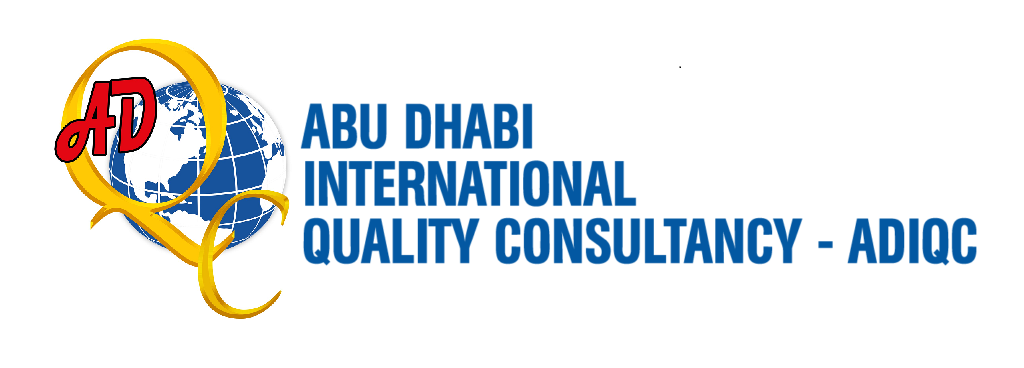Why Choose 'ADIQC'
Local company, created since 2007, sponsored by ‘Sheikh Khalifa Fund’
Proven reputation in the market, through the provision of ‘Quality’ services to our highly satisfied high profile organizations across all the business sectors for most of the services related to QHSE
Entrepreneurial and client-driven culture – With clear vision and mission, we deliver top-notch services to our prestigious clients in line with set values, principles and policies
Highly competent professionals – They’ve robust technical & managerial expertise, comprehensive portfolio of international memberships/certifications, right skills, and courteous attitude
Thorough in-depth knowledge of regulations & standards
Extensive market knowledge
Unique, best in class, problem-solving approach – Our professionals work in line with the international best practices and have unique problem-solving methodology that will best suit and serve your needs and expectations, for a specific challenge that your business is facing
Total customer satisfaction – Quality is our top priority, therefore, our professionals strive towards making it the best in regards to accuracy, completeness and timeliness
A wide range of services – We offer most of the services that relate to QHSE across all the business sectors
Top Ten Benefits Of ISO Certification To SMEs

Help You Comply With Regulations

Help You Improve the Qualities of Your Goods and Services

Help You Drive Growth, Cut Cost and Increase Profits

Open Your Export Market for your Goods and Service

open doors to new customers and strengthen your existing

help you compete with bigger enterprises

Give Your Business a Competitive edge
The Audit and Certification Process: How It Works?
Step A
Step B
Step C
Step D
Step E
What is ISO 9001:2015 certification?
ISO 9001 is one of the most internationally recognized quality management systems (QMS) standards. it is the global benchmark for QMS, topping over one million certifications worldwide.
Who can use ISO 9001:2015?
ISO 9001:2015 is a generic standard and applicable to any organization – irrespective of its size, type of products &/or services and geographical location. One of its major strengths is its wider appeal for all types of organizations, as it focuses on processes and customr satisfaction rather than procedures; thereby achieving a certification, for example, is equally applicable and beneficial to service providers and manufacturers.
Global sectors have also continued to focus their efforts on quality, with sector-specific QMS derivatives available for the automotive, aerospace, defense, and medical sectors.
Why is ISO 9001:2015 important for your business?
It provides the infrastructure, procedures, processes, and resources needed to help organizations for both monitoring and improving their performance to drive efficiency, client satisfaction and product excellence.
An ISO 9001 certification helps to deliver:
- Shareholder engagement,
- Organisational reputation,
- Client satisfaction, and
- Competitive advantage.
There have been numerous independent studies over the years demonstrating the benefits of implementing ISO 9001; one of these is a recent article published in a prestigious peer-reviewed academic journal from Harvard Business School.
What is ISO 14001:2015?
ISO 14001:2015 specifies the requirements for an environmental management system that an organization can use to enhance its environmental performance. ISO 14001:2015 is intended for use by an organization seeking to manage its environmental responsibilities in a systematic manner that contributes to the environmental pillar of sustainability.
ISO 14001:2015 helps an organization achieve the intended outcomes of its environmental management system, which provides value for the environment, the organization itself and interested parties. Consistent with the organization’s environmental policy, the intended outcomes of an environmental management system include:
enhancement of environmental performance,
fulfillment of compliance obligations,
achievement of environmental objectives.
ISO 14001:2015 is applicable to any organization, regardless of size, type and nature, and applies to the environmental aspects of its activities, products and services that the organization determines it can either control or influence considering a life cycle perspective. ISO 14001:2015 does not state specific environmental performance criteria.
ISO 14001:2015 can be used in whole or in part to systematically improve environmental management. Claims of conformity to ISO 14001:2015, however, are not acceptable unless all its requirements are incorporated into an organization’s environmental management system and fulfilled without exclusion
.
Who can use ISO 14001:2015?
ISO 14001 can be used by any organisation, irrespective of their type, size, nature of products and/or services or geographical location.Global sectors have also continued to focus their efforts on quality, with sector-specific QMS derivatives available for the automotive, aerospace, defense, and medical sectors.
Why is ISO 14001:2015 important to your organization?
Certification to ISO 14001 delivers a range of benefits to your organisation which include
- Reduced costs – as ISO 14001 requires commitment to continual improvement of the EMS, the setting of improvement objectives will help the drive for more efficient use of raw materials, so helping reduce costs
- legal compliance – ISO 14001 certification can help you by reducing the effort required to manage legal compliance and in the management of your environmental risks
- Reduced duplication of effort – your management system can integrate the requirements of this and other management standards into a single business system; thereby reducing duplication and costs
- enhanced reputation – ISO 14001 certification can help to reduce the risks associated with any costs or damage to your reputation associated with cleanups or litigation and builds your public image towards clients, regulatory bodies and key stakeholders
- Become a supplier of choice & lever competitive advantage – ISO 14001 certification enables you to work with companies who put an emphasis on environmentally friendly
organisations
- ease of integration – the standard is underpinned by the ‘Plan Do Check Act’ cycle in common with other management system standards thus enabling seamless integration with ISO 9001 (Quality), OHSAS 18001 (Health & Safety) and other management systems based standards.
How can we help you, achieve ISO 14001:2015 certification?
Our team of competent professionals will help you manage your business challenges, systems and risks to improve and protect your current and future environmental performance and meet your stakeholders’ needs.
- Our in-depth understanding and the technical expertise of our auditors enables us to deliver tangible benefits to our clients through a structured project management approach
- We know that good communication is pivotal in delivering transparency through every step of the EMS process; we work with our clients and set clear expectations for all parties on deliverables
- Our unique methodology helps organizations manage their systems and risks to improve and protect their current and future performance. We provide certification across all of the major management system standards. For organisations with other standards, we can often offer integrated assessments, thus delivering savings on both time and money.
What is ISO 9001:2015 certification?
ISO 9001 is one of the most internationally recognized quality management systems (QMS) standards. it is the global benchmark for QMS, topping over one million certifications worldwide.
Who can use ISO 9001:2015?
ISO 9001:2015 is a generic standard and applicable to any organization – irrespective of its size, type of products &/or services and geographical location. One of its major strengths is its wider appeal for all types of organizations, as it focuses on processes and customr satisfaction rather than procedures; thereby achieving a certification, for example, is equally applicable and beneficial to service providers and manufacturers.
Global sectors have also continued to focus their efforts on quality, with sector-specific QMS derivatives available for the automotive, aerospace, defense, and medical sectors.
Why is ISO 9001:2015 important for your business?
It provides the infrastructure, procedures, processes, and resources needed to help organizations for both monitoring and improving their performance to drive efficiency, client satisfaction and product excellence.
An ISO 9001 certification helps to deliver:
- Shareholder engagement,
- Organisational reputation,
- Client satisfaction, and
- Competitive advantage.
There have been numerous independent studies over the years demonstrating the benefits of implementing ISO 9001; one of these is a recent article published in a prestigious peer-reviewed academic journal from Harvard Business School.

